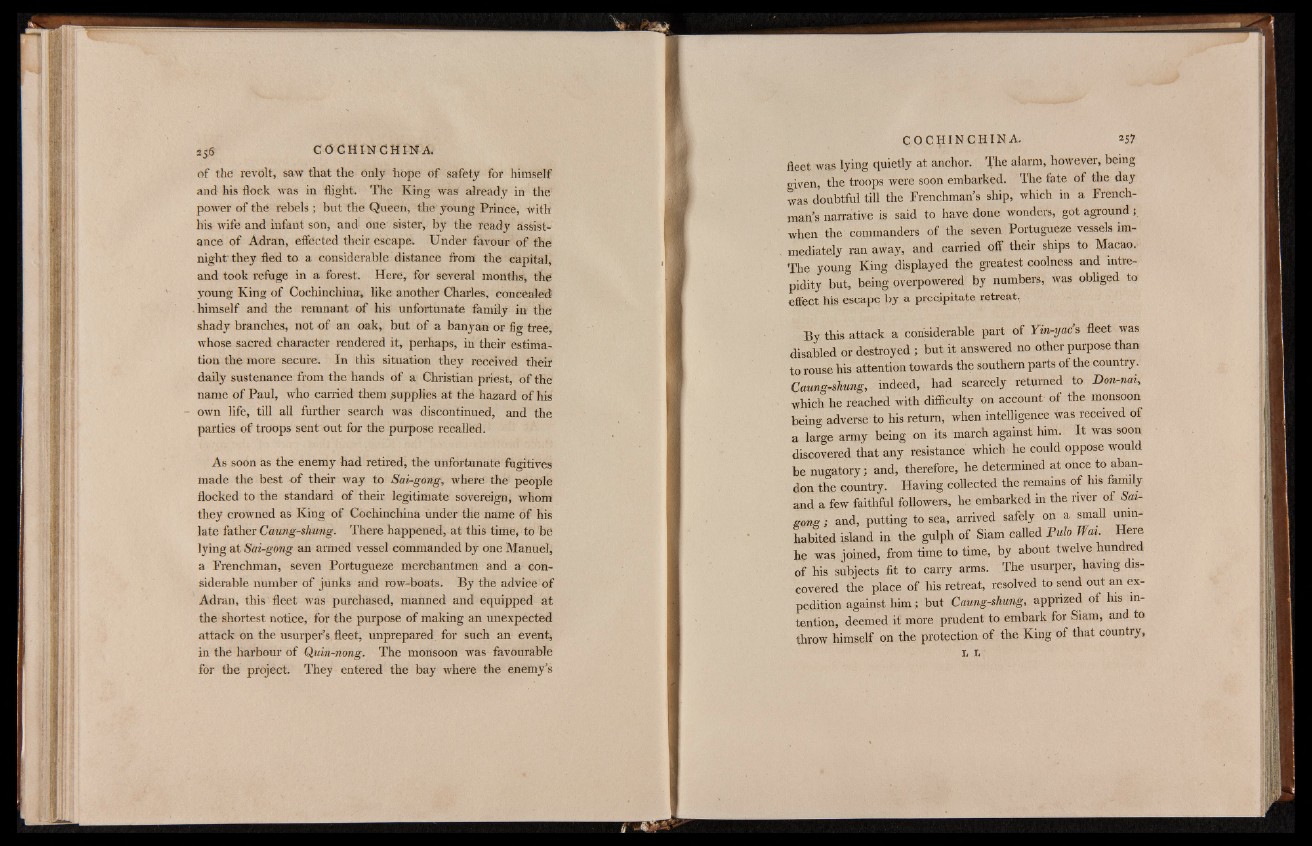
of the revolt, saw that the only hope of safety for himself
and his flock was in flight. The King was already in the
power of the rebels ; but the Queen, the young Prince, with
his wife and infant son, and one sister, by the ready assistance
of Adran, effected their escape. Under favour of the
night' they fled to a considerable distance from the capital,
and took refuge in a forest. Here, for several months, the
young King of Cochinchina, like another Charles, concealed
himself and the remnant of his unfortunate family in the
shady branches, not o f an oak, but of a banjran or fig tree,
whose sacred character rendered it, perhaps, in their estimation
the more secure. In this situation they received their
daily sustenance from the hands of a Christian priest, of the
name of Paul, who carried them .supplies at the hazard of his
- own life, till all further search was discontinued, and the
parties of troops sent out for the purpose recalled.
As soon as the enemy had retired, the unfortunate fugitives
made the best o f their way to Sai-gong, where the people
flocked to the standard of their legitimate sovereign, whom
they crowned as King of Cochinchina under the name of his
late father Caimg-shung. There happened, at this time, to be
lying at Sai-gong an armed vessel commanded by one Manuel,
a. Frenchman, seven Portugueze merchantmen and a. considerable
number of junks and row-boats. By the advice of
Adran, this fleet was purchased, manned and equipped at
the shortest notice, for the purpose of making an unexpected
attack on the usurper’s fleet, unprepared, for such an event*
in the harbour of Quin-nong. The monsoon was favourable
for the project. They entered the bay where the enemy’s
fleet was lying quietly at anchor. The alarm, however, being
given, the troops were soon embarked. The fate of the day
was doubtful till the Frenchman’s ship, which in a Frenchman’s
narrative is said to have done wonders, got aground j
when the commanders of the seven Portugueze vessels immediately
ran away, and carried off their ships to Macao.
The young King displayed the greatest coolness and intrepidity
but, being overpowered by numbers, was obliged to
effect his escape by a precipitate retreat.
By this attack a considerable part of Yin-yac s fleet was
disabled or destroyed ; but it answered no other purpose than
to rouse his attention towards the southern parts of the country.
Caung-sJiung, indeed, had scarcely returned to Don-nai,
which he reached with difficulty on account of the monsoon
being adverse to his return, when intelligence was received of
a large army being on its march against him. I t was soon
discovered that any resistance which he could oppose would
be nugatory; and, therefore, he determined at once to abandon
the country. Having collected the remains of his family
and a few faithful followers, he embarked in the river of Sai-
gong ; and, putting to sea, arrived safely on a small uninhabited
island in the gulph of Siam called Pulo Wat. Here
he was joined, from time to time, by about twelve hundred
of his subjects fit to carry arms. The usurper, having discovered
the place of his retreat, resolved to send out an expedition
against him; but Caung-shung, apprized of his intention,
deemed it more prudent to embark for Siam, and to
throw himself on the protection of the King of that country,